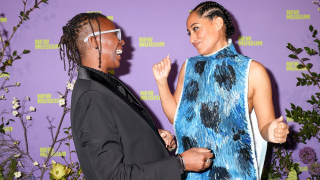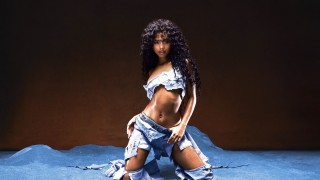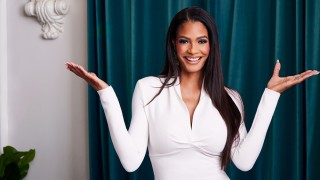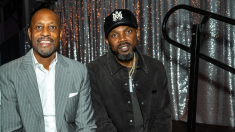In recent months, the biggest question across the sports world has not been “if” a player in one of the four major professional sports leagues would come publicly come out as gay. The only question has been “when.”
Public opposition to gay rights and same-sex marriage has been rapidly eroding but the locker rooms and clubhouses of Major League Baseball, the National Hockey Association, the National Football League and the National Basketball Association have been perceived exclusively straight and very homophobic. That narrative was destroyed this week by the Washington Wizards’ free agent center and 12-year NBA veteran Jason Collins, who became not only the first openly gay player in the NBA but also “the first active male athlete in a major U.S. team sport to come out of the closet.”
“I’m a 34-year-old NBA center. I’m black. And I’m gay,” wrote Collins in the May 6, 2013 cover story on Sports Illustrated. “I didn’t set out to be the first openly gay athlete playing in a major American team sport. But since I am, I’m happy to start the conversation.”
Collins’ coming out has become “ a landmark moment in U.S. sports history,” notes CBS Sports, earning him a personal phone call from President Obama, and an avalanche of positive messages across social media from sports and entertainment figures such as Kobe Bryant, Dwyane Wade, Tony Parker and many others.
“Jason Collins is going to be a great ambassador,” John Amaechi, OBE told EBONY.com. “Collins’ [future] will be just fine.”
In 2007, former Utah Jazz player John Amaechi became the first former NBA player to come out as gay when he came out of the closet in his autobiography, Man in the Middle. Amaechi became a media sensation—as well as the target for ugly homophobic rants.
“The day has finally arrived that an athlete in one of the four major leagues has come [out],” former Villanova University basketball player turned singer-songwriter Will Sheridan told EBONY.com. “It’s an incredible feeling.”
In 2011, Sheridan became “only the second former Division 1 male basketball player” to publicly come out of the closet as gay, reported Outsports. Amaechi was the first. “So many people called and texted me after Jason Collins came out and said, “You set the tone for that!” added Sheridan.
Jason Collins has demonstrated that you can “be Black, gay, out and play professional sports,” former NFL player Wade Davis told EBONY.com. Davis played for the Seattle Seahawks and Washington Redskins and came out after retirement. “Now people need to reframe the conversation around African-Americans and homophobia. Jason Collins said that he is a Black, gay man. Many other players who have supported him, such as Kobe [Bryant] and Dwayne [Wade] are also Black.”
Davis and Sheridan discussed the landscape for professional Black gay athletes in the critically-acclaimed 2012 anthology For Colored Boys Who Have Considered Suicide When the Rainbow is Not Enough. The book was edited by television commentator Keith Boykin.
Despite evidence to the contrary—such as numerous surveys or voting patterns—the “perception” of pervasive homophobia in the Black community and especially within professional sports has morphed into a media narrative. A number of Black professional athletes have spoken out for gay rights over the years—such as Charles Barkley, Michael Strahan and Will Demps publicly supported gay marriage as early as seven years ago—but the stubborn narrative remains.
“I was not surprised that the first [out] active male player would be from the NBA,” said former NFL player Wade Davis.
“The media incorrectly assumed that ‘the first’ player would be White and probably from hockey or baseball,” author and activist Darnell L. Moore told EBONY.com. Moore and Davis have co-founded You Belong, a sports leadership initiative for LGBT youth. “The majority of the NBA and the NFL’s players are Black, so, to me it came as no surprise.”
Almost 80 percent of the NBA’s players are Black. It has the highest percentage of Black players of any major professional sports league. Almost two-thirds of the NFL’s players are Black.
“I expect that the next three or four” professional sports players to come out could also be Black players, Amaechi told EBONY.com.
Jason Collins is not the first Black, pro sports athlete to come out—or even the first athlete of color. Sheryl Swoopes was among those who paved the way in the WNBA and, most recently, soon-to-be WNBA star Brittney Griner made her own announcement. Orlando Cruz became the first out and active pro boxer in 2012.
Unfortunately the high-profile cases of early, out Black pro-athletes have been marked by tragedy. Glenn Burke, superstar centerfielder for the Los Angeles Dodgers, was the “first and only Major League Baseball player known to have been out to his teammates” and team owners during his professional career in the 1970s. Burke was later ostracized by teams and died from AIDS-related causes in 1995. Justin Fashanu was the first British footballer come out in 1990, suffered vile homophobic and racist abuse, and, tragically took his own life in 1998.
“We’re not seeing any tragedy in Collins’ story. He’s smart, he is a Stanford graduate and he is inspirational,” said Darnell Moore, who notes that sports and the public are “still very” homophobic. “But is it fair to applaud only a certain type of Black gay man because we admire their skill and strength—like Jason Collins? Would Kobe [Bryant] and others athletes engage other Black gay men who are not celebrities or not as “masculine” acting? We shall see.”













